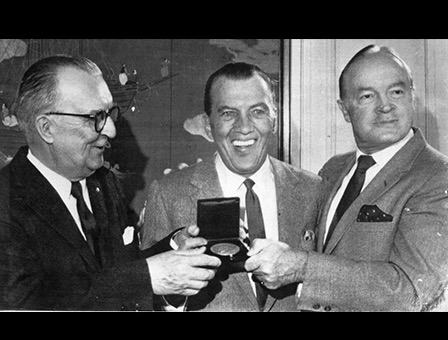Peabodys Widen Tent for 75th Edition

The smarter way to stay on top of broadcasting and cable industry. Sign up below
You are now subscribed
Your newsletter sign-up was successful
Celebrating its 75th anniversary, the Peabody Awards on May 21 will honor this year’s winners at a downtown Saturday-night gala, complete with some of the glitz and glamour more akin to higher-profile industry affairs.
The customary weekday Waldorf Astoria lunch (Peabody Awards Director Jeffrey P. Jones dryly calls it “the longest lunch in New York”) last year morphed into a splashier Wall Street soirée. This year’s edition, hosted by comedian Keegan-Michael Key, will air June 6 in edited form on Pivot.
Websites, viral videos and podcasts now qualify for the prestigious award, which historically had been more commonly equated with the likes of Edward R. Murrow, Morley Safer’s reports from Vietnam and classic groundbreakers like All in the Family.
Yet while the event at Cipriani Wall Street, the breadth of honorees and the expansion of the mediums in which they work are all decidedly of-the-moment, the Peabody organization, Jones says, very much remains committed to its core mission of awarding the best in storytelling using radio, television and, now, digital media.
“The question is whether they are stories that matter, that tell us something,” Jones says. “Extending the conversation” around those stories is an equally important part of the equation, he says.
This year’s winners represent the ever-growing range of mediums being used, a mix of time-honored legacy as well as new platforms. Local TV stations—WMAQ Chicago, WTAE Pittsburgh and WXIA Atlanta—are among this year’s 30 winners, as are TV networks including PBS, HBO and ABC, whose Black-ish made the list. So are the Do Not Track website, Amazon’s Transparent and Lifetime’s backstage drama Unreal.
“It is certainly a career highlight for me,” says WTAE reporter Paul Van Osdol, whose investigation into Pennsylvania fire departments is among the winners. “When you look at some of the work that’s nominated, when you’re up there with the 60 Minutes of the world and incredible work done by local stations around the country, it’s an incredible honor.”
The smarter way to stay on top of broadcasting and cable industry. Sign up below
Jones says that while each winner represents a different means of storytelling—traditional news, comedy and unscripted programming among others—they all jibe with Peabody’s criteria of having “broader import beyond just enjoyment.”
USA Network’s Mr. Robot, for example, won for addressing the issue of surveillance. Netflix’s comedy Master of None, created by Indian-American Aziz Ansari, forwards the industry by having a nonwhite star, Jones says.
Yet as the array of media—and the storytellers who use it—continues to grow, winning a Peabody may become increasingly elusive. There are simply more players in the field, Jones says.
In turn, the Peabody committee for the first time announced its 60 finalists, from which 30 winners were selected. (This is also the first year the number of winners is capped.)
Jones says that’s a nod to the preponderance of top-tier work being done. As new platforms increasingly prove their value in innovation, there simply may not be enough Peabodys to go around.
Good material, he adds, shines through regardless of the way it is delivered. “You don’t have to convince someone that a story is powerful,” Jones says. “They get it.”
2015 PEABODY AWARD WINNERS INCLUDE:
■ WTAE Pittsburgh, for its investigation into fire response times.
■ WXIA Atlanta, for its probe into the dangers of using smartphones for emergency calls.
■ WMAQ Chicago, for its investigation into the Laquan McDonald police shooting.
■ PBS Newshour, for reporting on the crises being created as people flee Syria and other war zones.
■ PBS, for Independent Lens: India’s Daughter; Isisin Afghanistan (produced with WGBH Boston); and POV: Don’t Tell Anyone.
■ ABC, for Black-ish and its airing of issues including race, class and guns.
■ HBO, for Real Sports With Bryant Gumbel: The Killing Fields; The Jinx: The Lives and Deaths of Robert Durst; and The Leftovers.
■ Netflix, for Beasts of No Nation; Marvel’s Jessica Jones; and Master of None.
